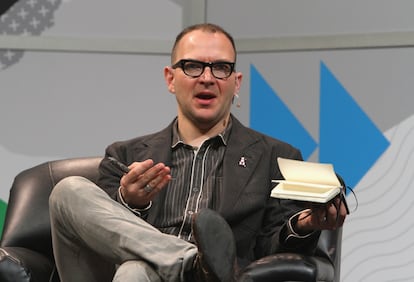Cory Doctorow, science fiction as a weapon against the metaverse: ‘We are not free, and we don’t know it’
In his new book, the writer and activist warns of the imposition of a default reality controlled by ‘the usual elites’

He writes in a garage. He wants to be safe from prying eyes. And virtual spies. Cory Doctorow, science fiction writer, “zuckervegan” and digital rights activist, can’t believe that the rest of the world lives as if it is not just a collection of data being bought and sold behind its back all the time. “We are not free, and we don’t know it,” says the writer, for whom Mark Zuckerberg and his virtual conglomerate — his budding metaverse — tramples relentlessly over a new kind of human right that is not talked about enough. “There may be changes in the world, but, in the background, there is a current that we don’t control. It is imposing a default reality, trying to reimpose that which is being fought against while keeping us entertained,” he says.
If his daughter’s name — Poesy Emmeline Fibonacci Nautilus Taylor Doctorow — is almost as interminable as that of the protagonist of his latest novel, the powerful dystopian Walkaway (Tor Books) — a sumptuous mix of Bret Easton Ellis, Douglas Coupland and Dave Eggers — it is because he wants to be able to throw data collectors off the scent as much as possible. “The longer your name is, the more untraceable you become. Somehow, with a name like that, you’re hacking the system. You are complicating things for all those straight, white, rich men, the usual elites, who are still behind everything that we consider the world today,” says Doctorow, who recalls — via video call from his home in Los Angeles — that it is the mechanisms of the system that end up deciding, for example, what is and what is not a family. “When they only take into account those they consider as such,” he adds.
Thus, he explains, when the DVD Forum — an organization founded in 1995 that included hardware, software, the media, and Hollywood itself — decided on which televisions the “spy” boards would be installed to discover what content to favor, it prioritized or “only included families with at least four members, who lived in, say, London, and could afford an in-car screen.” “If you were born in Manila and you have a son building a stadium in Qatar, what you see on TV doesn’t matter in the slightest to them, because they don’t consider you a family,” he adds. “There are people deciding what is and isn’t true in our lives based on data that they illicitly mine, and that reinforces an idea of the world that goes in the opposite direction of what you’re trying to build,” he explains.
That’s why awareness is so important, Doctorow says. In Walkaway, it happens that Hubert Vernon Rudolph Clayton Irving Wilson — and so on to complete the 21 names of the protagonist of the story, better known as Etcetera precisely because of that — and his best friend, Seth, decide to join Natalie, a rich heiress who inevitably rebels. The three meet at a communist gathering — the only thing left of communism in that apparently perfect future: pretend solidarity parties — and abandon what’s known as “society by default.” The world Doctorow imagines is so similar to our own that it could not be any other. Or it might be the same, but subtly sophisticated. In other words, restaurants automatically adapt their menus to the customer’s taste, and everything is “printed,” not “made,” as 3D printers do all the work.

The printers are, of course, remote-controlled by an artificial intelligence that, if it is able to x-ray its customers, it is because they are nothing more than a collection of data. You can only get out of such a society if you start walking away from the centers of power — and from everything that ties you to the system. You must become what has been called a walker, beatnik, or survivor of a dystopian reality that denies reality itself. Far away from these populated and controlled cities, there is a desert, where the devastating consequences of climate change prevent anything from growing. But where everything that exists is real, as it used to be. And it is here that Doctorow’s work aims and shoots in the same direction and with the same effect as the classics of Aldous Huxley and Ursula K. Le Guin did in their time.
“I’m accused of being a Luddite, and the Luddites were accused of something that had nothing to do with them. It’s not that they were against technological advances, they were against the use that was made of them. That childhood could be eliminated, as it was, because children could be put to work, thanks to machines. I am not against technology. When I think back to how long it took me to paper the neighborhood with flyers to fight for something when I was young, I can’t believe that it only takes one click today for the whole world to find out what you’ve set in motion. But we need a balance. The changes will only be real if we act analogically. In other words, the digital world must be a world of encounters, but we must stay on the street. It’s the analog that produces change,” he says.
Despite his “zuckerveganism” — that is, he doesn’t use any technology belonging to the creator of Facebook because Mark Zuckerberg, he says, “doesn’t respect our digital rights” — he confesses to being addicted to Twitter. “It is a mistake not to take virtual relationships into account. They saved us during the pandemic! We cannot deny that they have made our lives easier. My wife and I met when she was still living in London, and I was in Canada. In the beginning, part of our relationship developed virtually. Technology has enormous potential. It is the way we are being used while using it [technology] that is not right. We should be aware, that’s all,” he insists.
A devotee of Judith Merril, the science fiction writer who caused him to fall in love in the genre — a true creative hurricane, a driving force behind publications and literary workshops in his native Toronto — Doctorow believes that “the only way to win an ideological battle is to extinguish the imagination, and that’s what neoliberalism is trying to do through technology.” “If I wanted to be a science fiction writer from the beginning, it’s because I believe the genre presents alternatives to the world we live in, and it’s the only one that does. It tells us that things could be different,” he says. Despite everything, he is optimistic. “My 15-year-old daughter knows that the system can’t offer her anything and, like her, so do other kids. None of them have a future in today’s system, and this is what the elites have not yet understood and what can defeat them,” he concludes.
Sign up for our weekly newsletter to get more English-language news coverage from EL PAÍS USA Edition
Tu suscripción se está usando en otro dispositivo
¿Quieres añadir otro usuario a tu suscripción?
Si continúas leyendo en este dispositivo, no se podrá leer en el otro.
FlechaTu suscripción se está usando en otro dispositivo y solo puedes acceder a EL PAÍS desde un dispositivo a la vez.
Si quieres compartir tu cuenta, cambia tu suscripción a la modalidad Premium, así podrás añadir otro usuario. Cada uno accederá con su propia cuenta de email, lo que os permitirá personalizar vuestra experiencia en EL PAÍS.
¿Tienes una suscripción de empresa? Accede aquí para contratar más cuentas.
En el caso de no saber quién está usando tu cuenta, te recomendamos cambiar tu contraseña aquí.
Si decides continuar compartiendo tu cuenta, este mensaje se mostrará en tu dispositivo y en el de la otra persona que está usando tu cuenta de forma indefinida, afectando a tu experiencia de lectura. Puedes consultar aquí los términos y condiciones de la suscripción digital.









































